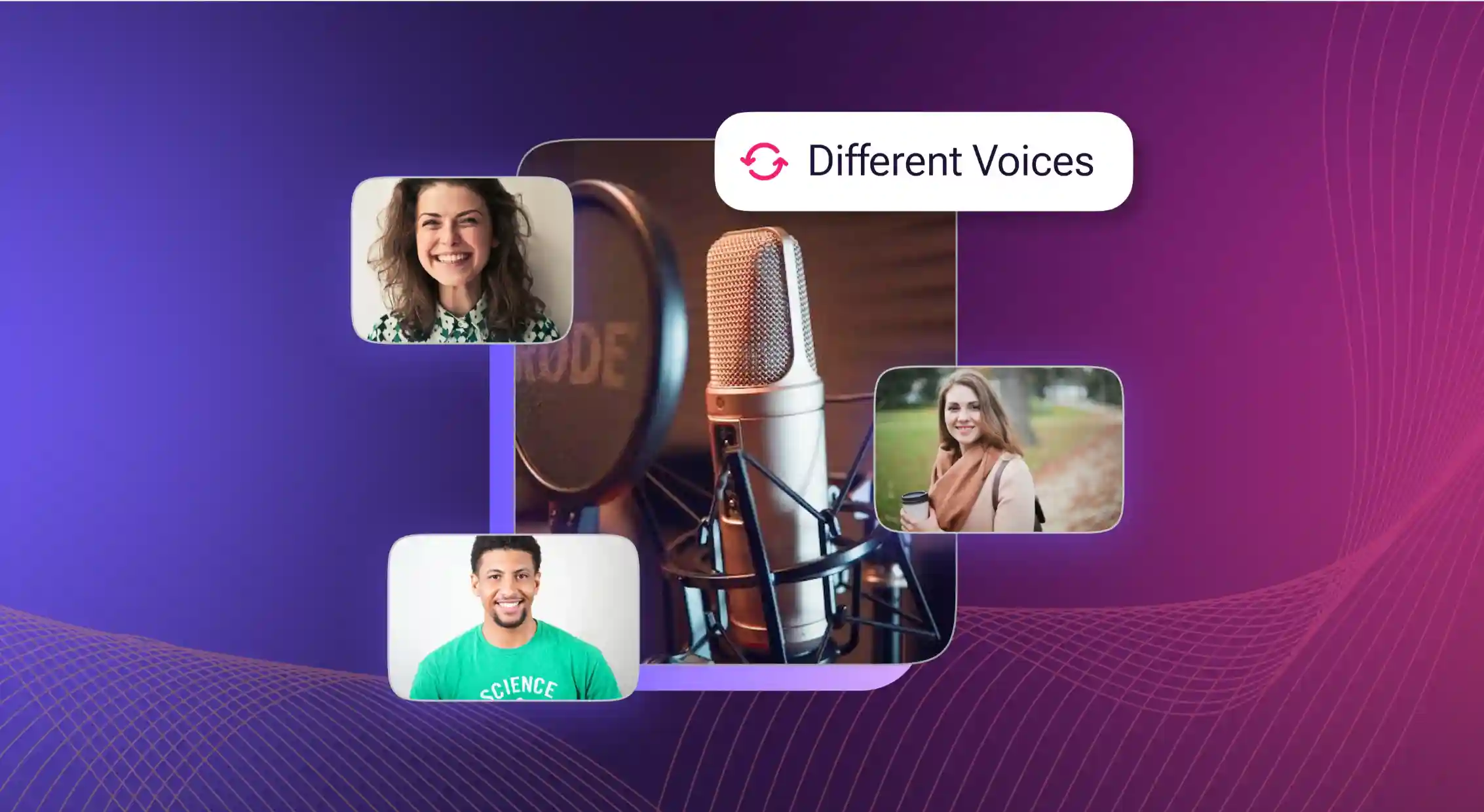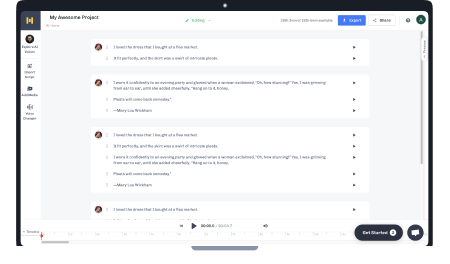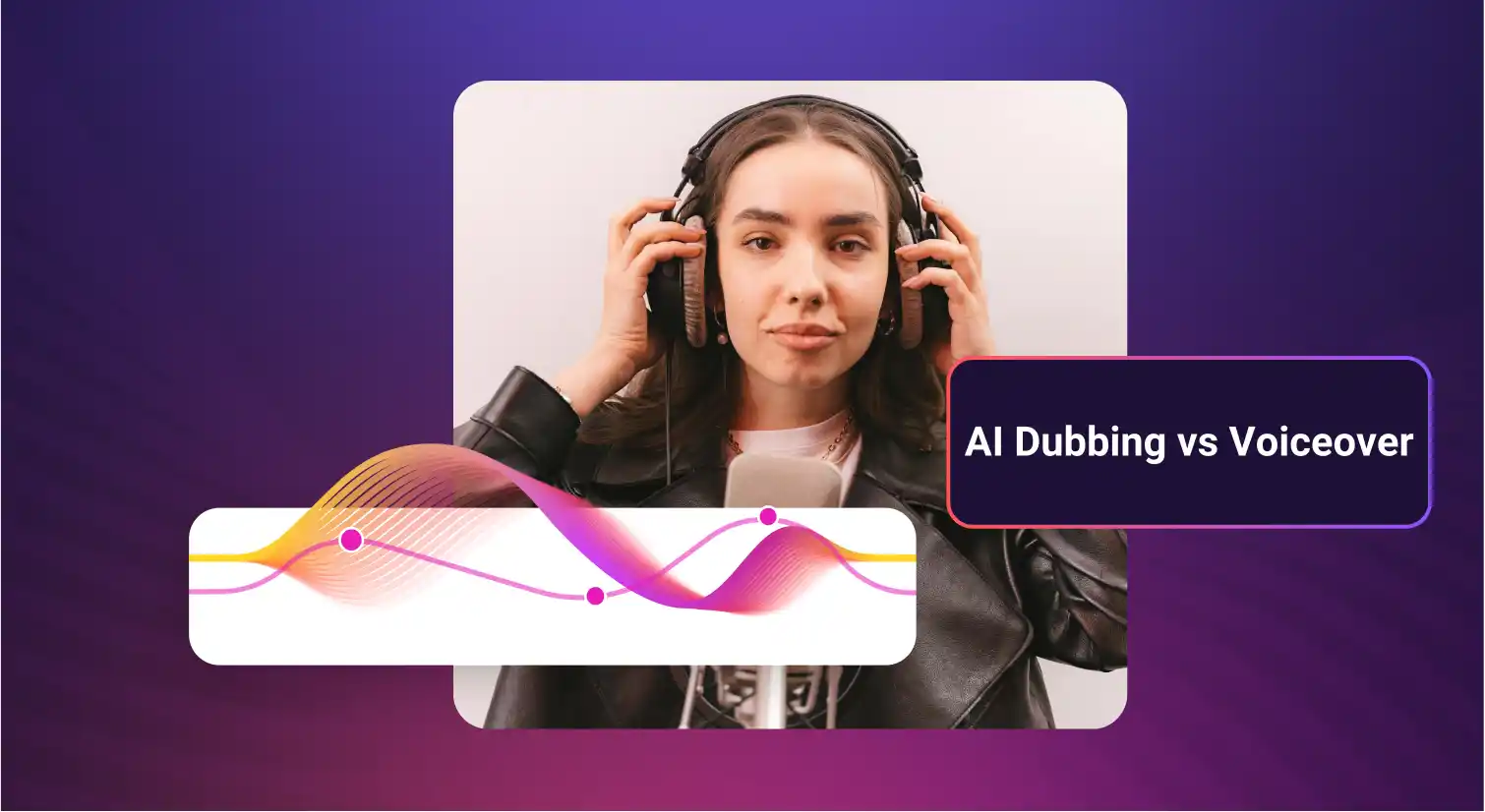Why Are TV Show Voice Actors Different?

In Justice League: Apocalypse War, released in 2020, the character of Superman was voiced by Jerry O'Connell, and Matt Bomer voiced Superman in 2012’s Superman: Unbound. In the live-action movie Man of Steel, Henry Cavil portrayed Superman. This happens for various characters in television, especially in franchise shows, when transitioning to TV from movies, and vice versa.
But why does this happen when studios and producers can hire the same person for all of these shows? Fans often wonder why such changes happen and why studios can’t make the characters sound alike. While as exciting as that may be to have these popular characters sound the same, the logistics are quite different.
In this blog post, let’s discuss why TV shows feature different voice actors, the challenges of it, and how AI can help address them.
Why Voice Actors Changed in TV Shows: 5 Reasons
Each TV show is different. The stories these shows want to tell, even with the same characters, are different. All these affect who voices each character.
Let's look at a few critical reasons to understand why TV show voice actors are changed from the movie.
1. Availability and Scheduling Conflicts
The availability of voice actors and scheduling conflicts are some of the biggest reasons why popular TV shows hire different voice actors for their shows. TV shows are often a big undertaking, even bigger than movies.
There are different characters, subplots, storylines, and seasons for a TV show. Hence, voice actors need to commit to multiple episodes or even seasons. Most of the time, these actors are busy working on multiple projects and may not have the time to dedicate to a show, even if they may have previously done it.
It may also happen that these voice actors may already have a packed schedule for other projects, and these schedules may clash, rendering them unable to work. A great example is the What If...? show by Marvel. Jeff Goldblum could not reprise the role of Grandmaster in the show's season 3 due to scheduling conflicts.
2. Budget Constraints in TV vs. Film
Movie stars are expensive to hire. Most TV shows have less budget than a movie, except for worldwide phenomenon like Game of Thrones, The Lord of the Rings: The Rings of Power, etc. Hence, studios are reluctant to hire movie stars to voice their shows' characters.
For example, Henry Cavill, who played Superman in Justice League in 2017, was paid about US $20 million for the role. Bringing him in to voice Superman in a TV show would cost the studio a lot since it would inflate the production cost.
Hiring TV show voice actors is the best from both financial and logistics perspectives.
3. Contractual Agreements
Most of the time, lead actors in huge movies sign contracts only to appear in only in movies. They are not contractually obliged to appear in any TV shows or series.
In addition, these stars have contractual obligations to other studios to not appear in TV shows or series when acting in one of their movies. This would also prevent actors, even if they are original voice actors, from coming back.
4. Dubbing Rights and Localization
TV shows and series are often dubbed into numerous languages worldwide for local populations. These audio dubbing and localization efforts must meet the unique demands of the local population to succeed.
Most of the time, the original voice actors may not have the necessary language skills to speak in all the languages. Also, local media businesses often buy the rights to dub these series in their language. Hence, it makes sense to hire local TV show voice actors to accurately dub and localize the series for consumption in their chosen markets.
For example, the Netflix show Money Heist was originally a Spanish show. It was dubbed in English for the world audience later. Another example is Squid Game on Netflix, which was originally in Korean.
5. Creative Decisions
Depending on a director's creative vision, how actors perform can also change. The director may have different approaches to these characters. This is another huge reason for changing voice actors, even for the same characters.
For example, if a TV series is set in a particular location, the director would want the characters of the series to speak like the people living there. The show Young Sheldon is a great example of this where the characters have a heavy Southern accent.
Another creative reason could be the nature of the character. A character like Sherlock Holmes may have a peculiar way of speaking, unlike a character like Peter in Family Guy. Hence, they must pick voice actors matching the characters, their nature, mannerisms, and other unique traits.
The Role of AI in Modern Voice Acting and Dubbing
Looking at the challenges discussed above, we can see that AI voice tools can address most of them. As AI is making strides in the field of voice overs and dubbing, it could be a great opportunity for studios and filmmakers to use AI dubbing free tools to power their TV shows. As studios explore voice AI dubbing, they can streamline production while keeping character voices consistent across movies and TV shows.
Here are a few ways AI can be used for modern voice acting and dubbing:
Voice cloning
AI text to speech voice tools, like Murf, allow you to clone voices and use them for TV shows, animated series, etc. For example, one of the biggest voice actors in the entertainment industry, James Earl Jones, has allowed Disney to clone his voice for the show Obi-Wan Kenobi.
Similarly, directors can use voice cloning to enable their characters to express themselves in unique ways using text to speech AI tools.

Murf offers powerful and robust voice cloning capabilities on its platform. Murf's voice cloning allows storytellers to get pitch-perfect voice clones like the original voice.
Synthetic voice generation
Using AI, you can create original synthetic voices for your movie or video productions. This reduces the need to hire original voice actors and improves the creative process behind films and video games. This can be extremely useful for video games and Japanese anime-styled productions.
You can also customize the voice to meet your needs, such as different accents, tones, and styles that match the character and their situations.
Tools like Murf AI also allow you to get the exact emotion and feeling from the voice.
Voice customization options
Modern AI voice platforms, like Murf AI, offer plenty of options to customize the voice to get the exact output users want.
For instance, in Murf, you can adjust the tone and style of the voice you want. You also have options like variability, pause, pitch, speed, emphasis, etc., to create the exact voice and emotion you need.

By playing with these customization options, you get the exact voice output, even with complex lines without mistakes.
Pre-recording previews
Dubbing characters often takes a lot of time, and the director must show how to modulate and present the characters' dialogue.
For the output to be perfect and align with the director's vision without differences, both the actor and the director need to be at the studio. With Murf AI, this concern can be eliminated entirely by creating pre-recording previews that voice actors can use as references.
It will save everyone's time and accelerate the dubbing process, as well, with no difference in the output.
How AI Can Preserve Consistency in Voice Acting for TV Shows
The logistics of bringing voice actors to dub for characters when they are busy is the hardest part of being a studio or production company. They need to plan the schedules in advance and ensure that everything works exactly as planned.
However, it may not always happen as expected. There could be several challenges that may delay the project entirely. Here is how AI can help you address this challenge:
- Using the voice actor's clone, you can complete the dubbing process in time and save your project's timeline.
- AI platforms often include tools that allow creators to adjust pitch, tone, and emotional delivery easily. You can use these tools to adjust the outputs created by new actors for better results.
- Use AI tools to make changes in dialogues in the original actor's voice, even in the series finale, to deliver the best output and ensure it aligns with the overall creative vision.
- Change and replace dialogue using Automatic Dialog Replacement or ADR in scenes already shot in principal photography.
The Future of Voice Acting in TV and Film

The AI voice generator industry is expected to be worth US $6.4 billion by 2033, with a CAGR of more than 15%. This means that studios and production companies are more likely to use these AI tools for their TV and movie projects. However, AI adoption in the voice-acting industry has not been received well by dubbing professionals in the field. And their concern is valid, given how their job could be affected. While adopting these tools is extremely beneficial for production companies and studios, it needs to be done ethically and by addressing the concerns of voice acting professionals.
Many creators and fans often wonder, 'is dubbing AI safe?' The answer lies in how responsibly studios adopt these tools, ensuring both data security and fair use while respecting the craft of voice actors.
However, these AI voice generators are here to stay, and businesses in the entertainment industry are actively embracing them. Murf AI is among the best in the field if you are looking for a reliable AI voice tool for dubbing and localization of TV shows or social media content.
Create a free account with Murf AI to see it in action.

Frequently Asked Questions
Why do some characters have different voice actors in different seasons of a show?
.svg)
There are several reasons for a character to have different voice actors in different seasons of a show. They can range from scheduling conflicts, creative decisions, and the original actor leaving the show to changes in storyline and the character's age, etc.
How does dubbing work in different languages, and why do some voices sound completely different?
.svg)
When working on dubbing in different languages, one needs to understand that language is deeply connected to the people's culture. How people speak, their body language, etc. Hence, all these elements need to be taken care of. Dubbing works the same in different languages, and differences in culture and semantic traits of a language can also make some voices sound differently.
What are the biggest challenges in maintaining voice consistency in long-running series?
.svg)
Some of the biggest challenges include the evolution of a character, having different writers with distinct approaches to the character, changes in the theme of the show, and more. As the character grows and develops through the series, voice modulations and intonations can change. This might also be a challenge to ensure consistency in voice.




![Here's How to Translate TikTok Videos in Minutes [in English!]](https://cdn.prod.website-files.com/675151245f2993547dbd5046/697b408b2d612cc6f3d31a38_67b448f0b2d1a657a0d02d2e_Hero%252080.webp)

.webp)
.webp)



%2520and%2520English%2520Dub%2520Cast.webp)






